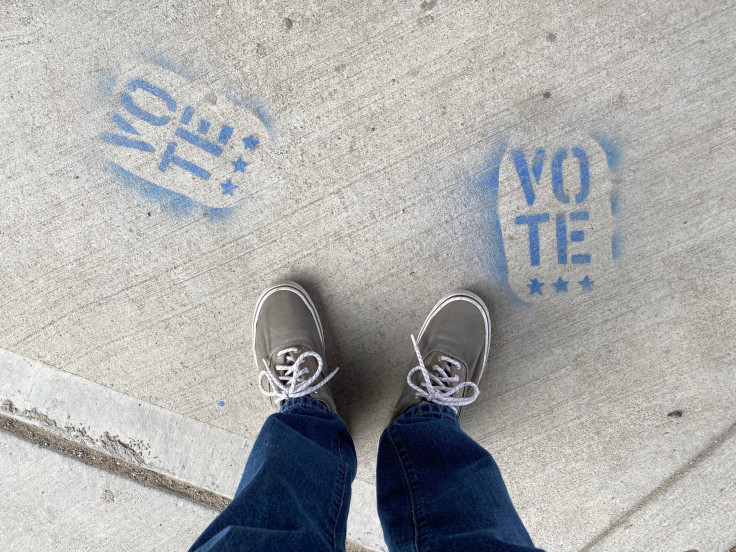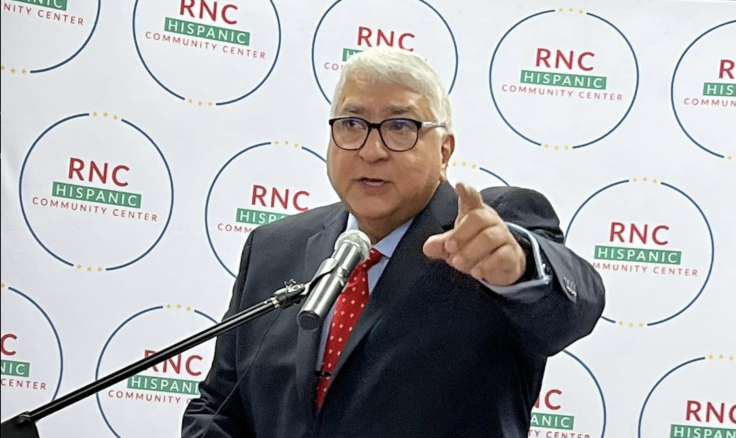
Jaime Florez is a Republican, Hispanic and a communicator, so when the Republican National Committee came knocking on his door with a job offer that checked off all of those boxes, he didn't hesitate.
His role, the RNC's Hispanic Director of Communications, has been gaining electoral relevance along with the increase of the demographic's growth throughout the century. According to a Pew Research Center report, Hispanics were projected to make up 14.3% of eligible U.S. voters in Oct. 2022, a testament to the demographic's rapid growth in the U.S. In 2000, the figure was just 7.4%. About 34.5 million Hispanic Americans will be eligible to vote in the next presidential election.
Florez has been involved with the Republican party in one way or another since 2014, but he officially joined the RNC in 2021. He is an immigrant from Bogota, Colombia, and moved to the U.S. in 1983.
The Latin Times spoke with Florez about his views on immigration and how he believes the system needs to change, his support for immediate legalization of the Dreamers Act, what attracts Hispanics to the Republican party and how it can align with their beliefs.

Immigration
"Because there are so many loose cables in immigration, we have to make sure we solve every one of those problems, and if necessary, one-by-one," Florez said. "Maybe that is the problem, and the reason why we haven't been able to reform our immigration laws is because we've been trying to do it all together," said Florez.
He believes that the first issue that needs to be addressed are unlawful border crossings, which have surged recently and are on track to break new records.
The second issue, he said, is dealing with the status of immigrants who have been in the country for years. If people really want to help immigrants, he added, money should be invested towards the "United States Citizenship and Immigration Services" to offer solutions to immigrants in the U.S. who already have pending immigration cases.
Florez said people think that immigrants are happy about the situation at the southern border, but that is not the case. "The first victims of this failed border policy are the immigrants. Those who came to this country and paid for their dues and waited the time that they had to wait to get their immigration problem solved." "And now they're seeing millions of people who we don't know who they are and where they came from."
Citizenship for Dreamers
"Dreamers have to be legalized immediately. If they can prove they have been here in this country illegally without them even knowing, that is very easy to prove because they don't have any documents of them entering by themselves. They came here when they were children and can prove they've been in school for many years," Florez said. He said people who qualify for Dreamers did not break any laws; their parents did, and they cannot be guilty of that.
Florez said the people who qualify have no country to be sent back to because they probably don't speak the language, they probably don't have family there and they have no future there because they already built it in the U.S.
Florez said there needs to be bi-partisan immigration policies, ones that won't change when the government does. He said they need to reach out to Hispanic leadership from both parties to put together these policies because the people putting together the policy should have firsthand experience.
"One of the things that I say quite often is, 'you don't know anything about immigration unless you have had to wait in lines for days to get a document or an approval of something, or when you have had to wait for years to get your green card, and for years to get your citizenship,' that's something that we as immigrants had to pass through and lived," Florez said.
Why the Republican Party appeals to Hispanics
According to a Pew Research Center study, the majority of Hispanics are Democrats: 60% of Latinos say the Democratic party represents their interests. In comparison, 34% said the same about the Republican party.
Florez believes this could have been a genuine mistake by many Hispanic immigrants when becoming citizens. He said when people become U.S. citizens, they have the opportunity to register with a political party, and because many Latinos came to the U.S. from a country that lacked democracy, when they see "Democrat," they think democracy and democrat are the same thing.
"I don't know what percentage, but I've spoken with people, and they've told me, 'When they offered me the opportunity, I definitely decided to be a Democrat because we need to defend democracy,' which nowadays one thing has nothing to do with the other," Florez said. In addition to that, he said many of the mainstream media outlets mainly produce content that aligns with Democratic party views. Florez said the Republican party doesn't get many chances to share their conservative views.
For Florez, many of those conservative views were precisely why he became a Republican. "For me, like it's happening for many Hispanics, I've discovered that the principles and values of the Republican Party align much better with my principles and values than those of the democratic party."
Florez said Republican beliefs align with many Hispanic beliefs, such as valuing family, life, religion, God, freedom and opportunities. He said many Latinos came to the U.S. fleeing socialist policies that created social and economic problems for countries like Cuba, Venezuela, Nicaragua, Bolivia, Argentina and Brazil.
Outreach
Right now, Florez said he's doing outreach through the RNC's Community Centers, which are focused on minority communities. There are 18 of these community centers in Hispanic communities, which Florez said have been used as campaign offices but also as a place to have permanent two-way conversations with community leaders and community members.
Florez said during the last election cycle, someone was at that office five or six days a week permanently, and it also became a gathering place. "We were able to be the place where people meet and had events for the Venezuelans, the Nicaraguans, the Cubans, Colombians as well. That worked very well," Florez said. "People felt like they had a place, not only a place where they were receiving information from us but a place where they could go and make suggestions and propose ideas."
Florez said they would hold courses where they teach people what to study for the U.S. citizenship test. He said each community center differed depending on the state, but the RNC returned those centers this election cycle.
-To ensure fair and unbiased coverage, The Latin Times will seek to speak with political actors from across the ideological landscape in the United States.
© 2025 Latin Times. All rights reserved. Do not reproduce without permission.





